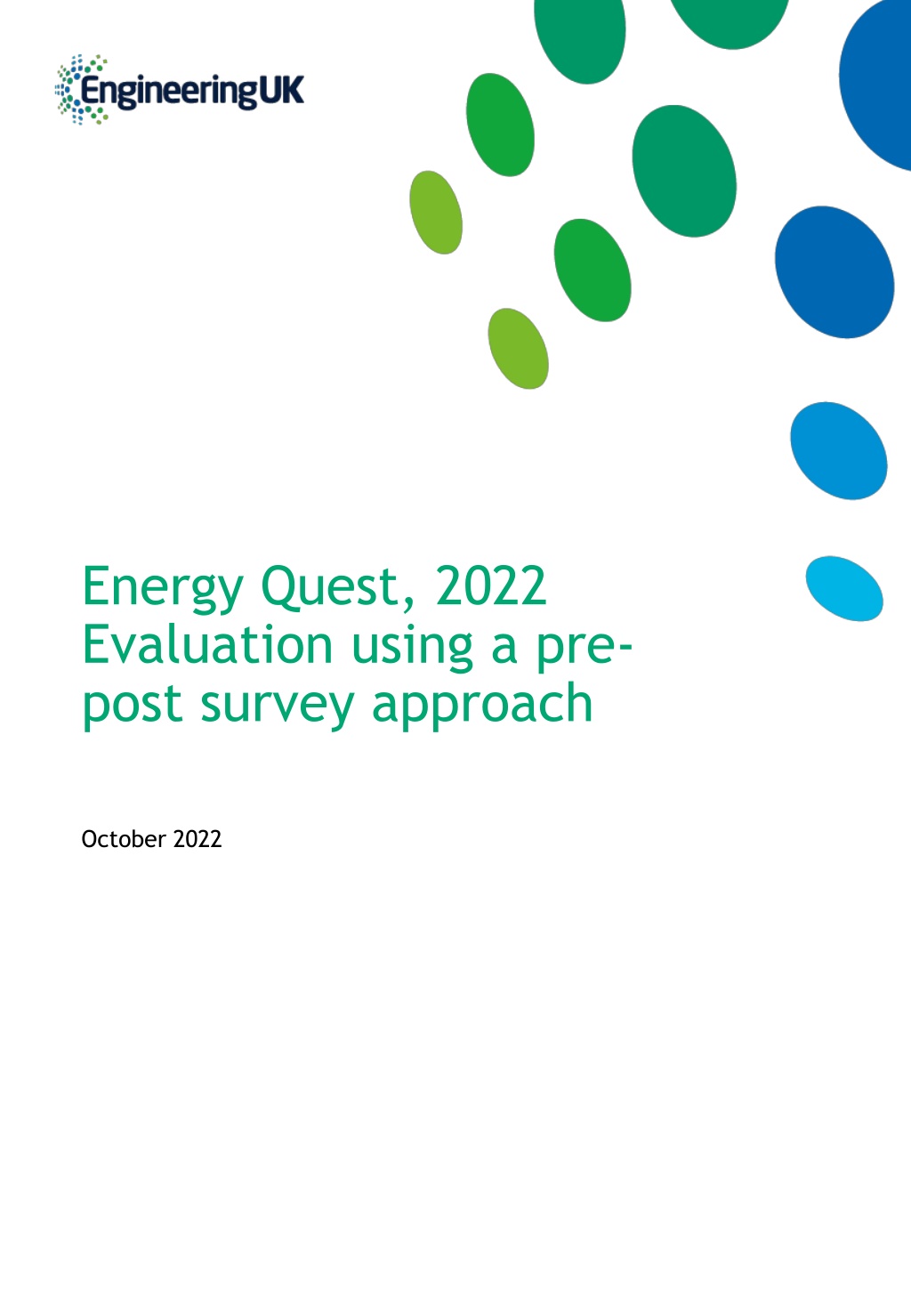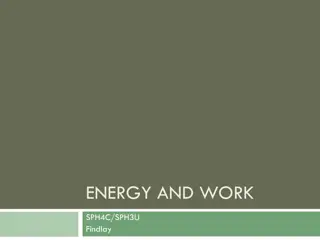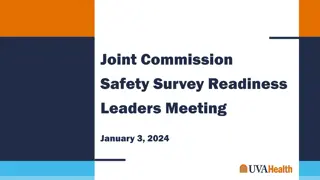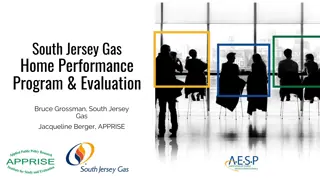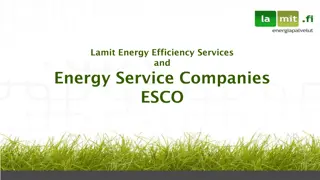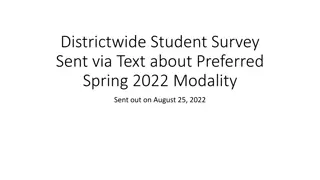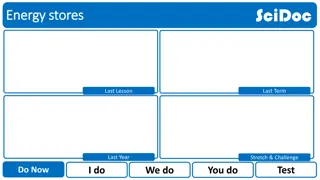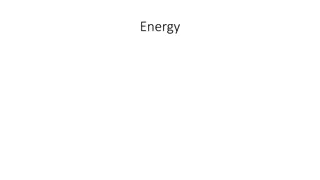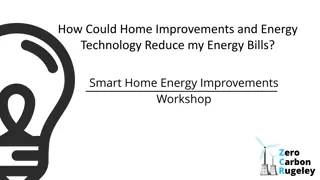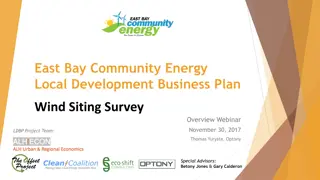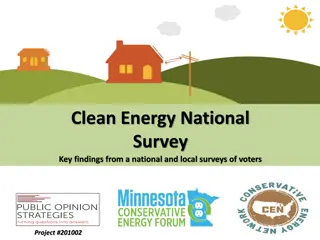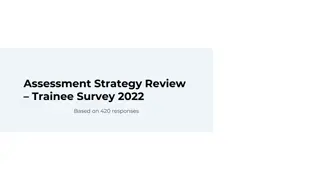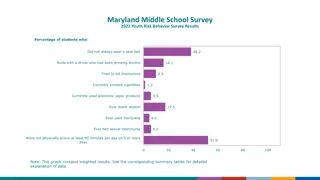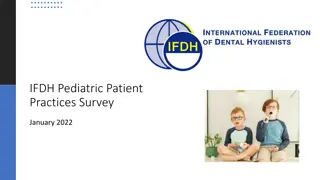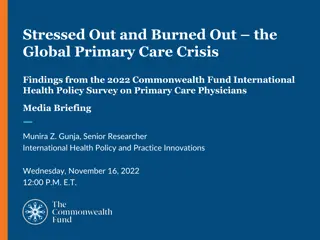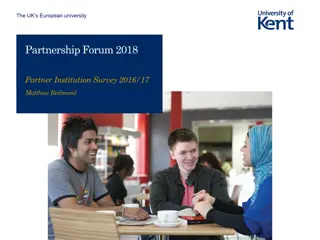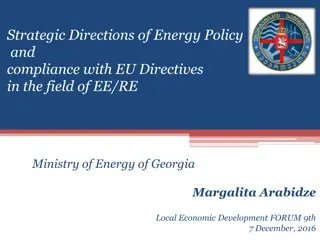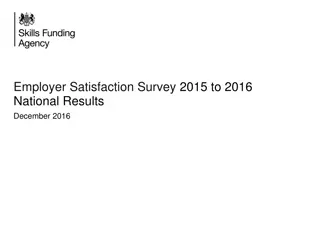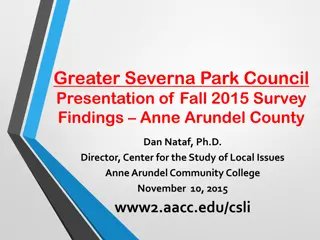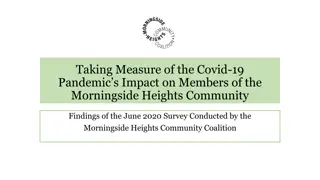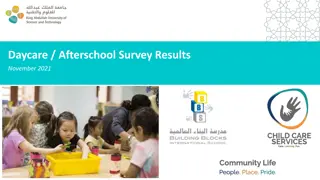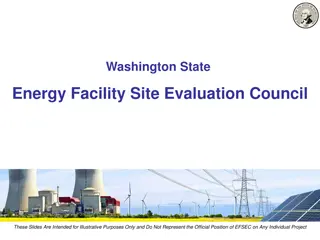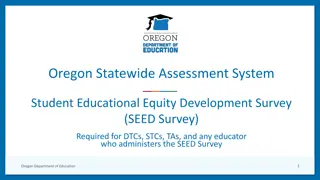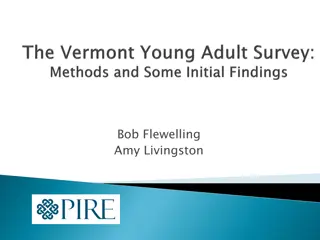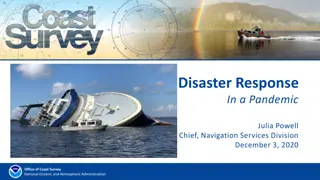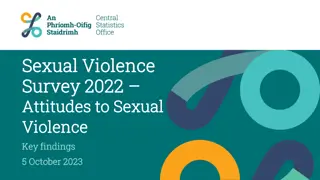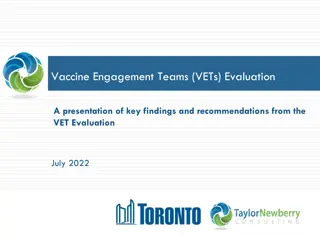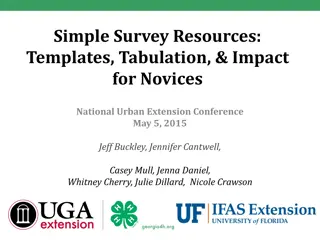Energy Quest 2022 Evaluation: Pre-Post Survey Approach Findings
Energy Quest, a workshop in UK secondary schools focusing on engineering careers and sustainable energy, underwent evaluation in 2022 using a pre-post survey approach. The pilot study analyzed changes in students' views before and after the workshop. Findings highlight shifts in students' responses, considering positive or negative movement and odds of giving a positive response. The report offers insights for future data collection improvements.
Download Presentation

Please find below an Image/Link to download the presentation.
The content on the website is provided AS IS for your information and personal use only. It may not be sold, licensed, or shared on other websites without obtaining consent from the author. Download presentation by click this link. If you encounter any issues during the download, it is possible that the publisher has removed the file from their server.
E N D
Presentation Transcript
Energy Quest, 2022 Evaluation using a pre- post survey approach October 2022
Introduction Energy Quest is a workshop delivered in secondary schools across the UK to inspire and inform young people about engineering careers with a particular focus on the role of engineering in developing sustainable energy. Energy Quest is being evaluated over three years drawing on surveys completed by students and teachers following the workshop. The evaluation seeks to understand the experience of schools engaging in the workshop and the perceived impact of the workshop on students knowledge, attitudes and aspirations. programme, the experience of schools and feedback for improvement can be found in the full evaluation report [link here once the report is completed]. Seven schools participated in the pilot. The number of students who completed both pre- and post- workshop questionnaires ranged from 66 to 8. The survey was completed online, which meant that schools had to find time with access to devices. This proved difficult in some cases, particularly close to the end of the school year. As a complement to that evaluation, in 2022 we piloted a pre-post approach to data collection with a sub-sample of students who took part in the workshop. In these schools, students completed surveys both before and after the workshop to allow a more objective assessment of change on some of the key measures of success for the programme. The low number of matched responses in one school particularly may introduce some selection bias and this is a weakness of the evaluation. This report gives the findings of that pilot. They focus specifically on the change in those key measures that we anticipated would change as a result of the workshop. More complete analysis of the reach of the As well as giving the findings from the analysis of the pre and post data, this report provides some reflection on the pilot and how data collection might be strengthened in future.
Introduction Throughout this report we provide analysis to show to what extent students views have changed following the workshop. For each question we provide three key pieces of analysis which help to develop a better understanding of any shift. Most of the items used in this survey follow a likert scale structure, allowing students to give a response on a five-point scale with a strong negative on one end and a strong positive on the other. measure. These are only reported where a difference was found between the two groups Positive or negative movement A second way of looking at the data is to compare individual scores before and after the workshop to see whether students are moving towards a more positive response or a more negative response. This may be from any starting position (e.g. from strongly disagree to disagree or from agree to strongly agree) and by any distance (e.g. from strongly disagree to disagree or strongly disagree to strongly agree). To make sense of this data, we provide three ways of comparing the pre-workshop responses and the post- workshop responses. The odds of giving a positive response Since to achieve our desired impact, students needs to be positive about STEM and STEM careers, we first look at the data using a binary approach, comparing positive responses (e.g. strongly agree and agree) with all other responses (e.g. strongly disagree, disagree and neither). We then calculate the odds of students giving a positive response before the workshop and after the workshop. This is expressed as an odds ratio. An odds ratio of 2, for example, would mean that students were twice as likely to give a positive response following the workshop. This is important to consider, as the workshop may move some students further away from considering STEM as well as closer towards it. Comparing mean scores Finally, to assess whether there has been any change across the whole scale, we code the scales using numeric values from -2 (e.g. strongly disagree) to 2 (e.g. strongly agree) with 0 as the neutral response. We then calculate and compare the mean scores using paired-sample t-tests. This allows us to see whether there has been any genuine shift along the scale as a whole. We also calculate the odds separately for male and female students on each
Who responded to the survey? Participating schools were asked to ensure that all students who took part in the Energy Quest workshop were given time within the school day to complete the surveys. In total 259 students completed surveys before and after the workshop and we were able to match these through a unique identifying code Schools in Scotland and Wales tended to have fewer workshops than in England, so the number of eligible students in these two schools was lower. All the schools participating in the pilot met our Equality, Diversity and Inclusion criteria.1 Number (%) Total 259 UK nation England 206 (80%) 14 (5%) 39 (15%) 101 (39%) 117 (45%) 33 (13%) 122 (47%) 123 (47%) 4 (2%) 10 (4%) Scotland Wales School year Year 7/S1 Year 8/S2 Year 9/S3 Gender Female Male Non-binary, questioning or self-described gender Chose not to answer Ethnicity Asian or Asian British 54 (21%) 46 (18%) 12 (5%) 123 (47%) 9 (3%) 15 (6%) 23 (9%) 204 (79%) 20 (8%) 12 (5%) Black or Black British Mixed or multiple ethnicities White Any other ethnicity Chose not to answer Free school meals Yes No Don t know Chose not to answer 1. Equality, Diversity and Inclusion criteria, based on student population with higher numbers from groups typically under-represented in engineering. For more detail, see EngineeringUK EDI Criteria - Tomorrow's Engineers (tomorrowsengineers.org.uk)
Impact of the workshop on knowledge of engineering careers The workshop aims to increase students knowledge about the types of things that people who work in engineering do. After the workshop both male and female students were twice as likely to say they know about the kind of things engineers do in their jobs.1 Over half of participating students (58%) already agreed that they know about the types of things engineers do before the workshop. Following the workshop this had increased to 74%. learning more in the workshop. It also doesn t capture increased knowledge among those who already strongly agreed with this statement. 32.2% of students gave a higher knowledge rating after the workshop compared to before, 15% gave a lower rating. The remainder (53%) did not change their score. This measure cannot tell us how many students found that some of what they felt they knew about engineering before the workshop was changed as a result of In general, I know about the types of things that engineers can do in their jobs 70% 60% 50% 40% 61% 30% pre (n-254) 53% 20% 8% 30% 5% 4% 4% 4% 10% post (n=251) 18% 13% 0% Strongly disagree Disagree Neither Agree Strongly agree Mean scores before and after workshop In order to assess whether the change across the full range of responses was statistically significant, the likert scale was coded from -2 (strongly disagree) to 2 (strong agree) and we compared the mean scores before and after the workshop. 2 1.5 1 0.5 0.75 0.48 0 A paired-sample t-test showed that the increase in mean scores from the pre- workshop survey (M=0.48, sd=0.85) to the post-workshop survey (M=0.75, sd=0.88) was significant at the 0.05 level (t(245)=- 4.5, p<.05). -0.5 -1 -1.5 -2 Pre-workshop Post-workshop 1. Students responding agree / strongly agree vs all other responses, OR = 2.13 95%CI [1.46, 3.1]); male students: OR=2.09 95%CI [1.2, 3.6]; female students: OR=2.02 95%CI [1.2-3.5].
Impact of the workshop on knowledge of engineering careers The workshop also aims to increase students knowledge about the diversity of engineering careers. Again, students were asked to assess their own knowledge. After the workshop students overall were 80% more likely to say they know about the range of careers engineering can offer.1 When looking at male and female students separately, there is no longer a difference between pre- and post- scores for male students, but female students are over twice as likely to agree that they know about a range of engineering careers after the workshop than before.2 the workshop this had increased to 70%, with more female students agreeing (73% cf 64%). Once again, this does not mean that students who agreed or strongly before and after the workshop did not increase their knowledge at all. The graph below shows that the majority of students (56%) already agreed that they know about the range of careers engineering offers before taking part in the workshop. This was slightly higher for male students (59% cf 54%). Following Over a third (35%) of students gave a higher rating of their knowledge of the diversity of engineering careers after the workshop, 19% gave a lower rating and 46% did not change their response. I know about the range of careers that engineering can offer 70% 60% 50% 40% pre (n=254) 30% 55% 46% post (n=251) 20% 28% 4% 3% 22% 4% 10% 15% 13% 10% 0% Strongly disagree Disagree Neither agree nor disagree Agree Strongly agree Mean scores before and after workshop 2 A paired-sample t-test showed that the increase in mean scores from the pre- workshop survey (M=0.48, sd=0.94) to the post-workshop survey (M=0.72, sd=0.92) was significant at the 0.05 level (t(245)=- 3.5, p<.05). 1.5 1 0.5 0.72 0.48 0 -0.5 -1 -1.5 -2 Pre-workshop Post-workshop 1. Students responding agree / strongly agree vs all other responses, OR = 1.82 95%CI [1.26, 2.62] Female students responding agree/strongly agree vs all other responses, OR = 2.32 95%CI [1.35-3.98] 2.
Impact of the workshop on knowledge of engineering careers The final area in which the workshop specifically aims to increase students knowledge of engineering is in the role of engineers in developing greener technologies. After the workshop students no more likely to say they know about the engineers play in developing greener technologies.1 Before the workshop, three out of five (60%) students said they know about the role that engineers play in developing greener technologies. knowledge measures and is not significant. 29% of students rated their knowledge as higher following the workshop, and 21% rated it as lower. 51% did not change their response to this question after the workshop. There is a slight increase following the workshop to 66%, but this is a much smaller shift than for the other I know about the role engineers play in developing technologies that are better for the environment 60% 50% 40% 30% pre 51% 49% post 20% 29% 25% 4% 10% 4% 2% 15% 11% 9% 0% Strongly disagree Disagree Neither Agree Strongly agree Mean scores before and after workshop A paired-sample t-test showed that this smaller increase in means was not statistically significant (pre: M=0.59, sd=0.87; post: M=0.68, sd=0.92, (t(245)=-1.43, p=0.15). 2 1.5 1 0.5 0.68 0.59 0 This can also be seen from the overlapping confidence intervals in the chart to the right. -0.5 -1 -1.5 -2 Pre-workshop Post-workshop 1. Students responding agree / strongly agree vs all other responses, OR = 1.29 95%CI [0.90, 1.85])
Impact of the workshop on interest in a STEM career Students were asked about their level of interest in STEM careers before and after the workshop. After the workshop students no more likely to say they are interested in a career that involves engineering.1 Prior to the workshop, nearly half the students (45%) said they were interested in a career that involves engineering. Following the workshop this proportion was almost the same (46%), but with a slight shift towards students being very interested. At the other end, there was a decrease in those who said they were not interested in an engineering career, from 27% to 21%. 28% of students increased their interest in engineering following the workshop, and 21% decreased. Half the students (51%) did not change their rating. How interested are you in a career that involves engineering? 40% 35% 30% 25% 20% pre 32% 31% 30% 15% post 29% 10% 17% 16% 13% 13% 10% 5% 9% 0% Not at all interested Not interested Neither Interested Very interested Mean scores before and after workshop 2 The increase in mean scores for interest in engineering careers, while small, was significant at the <.05 level (pre:M=0.06, sd=1.23; post: M=0.24, sd=1.16; t(215) = -2.93, p<.05, suggesting that the workshop does have a small but real impact on students interest in engineering. 1.5 1 0.5 0 0.24 0.06 -0.5 -1 -1.5 -2 Pre-workshop Post-workshop 1. Students responding interested / very interested vs all other responses, OR = 1.08 95%CI [0.76, 1.54])
Impact of the workshop on interest in a STEM career We also asked students about their interest in science careers before and after the workshop. After the workshop students no more likely to say they are interested in a career that involves science.1 A similar pattern is seen for interest in science careers as was seen in relation to engineering careers. Over half of the students were interested in a science career before the workshop (52%). The same proportion were interested after the workshop but there was a shift towards more being very interested (20% after, compared with 15% before). 22% of students gave a higher rating of interest following the workshop, and 20% gave a lower rating, 58% did not change their score following the workshop. How interested are you in a career that involves science? 50% 45% 40% 35% 30% 25% pre 20% 37% post 33% 10% 9% 15% 29% 7% 26% 10% 20% 15% 14% 5% 0% Not at all interested Not interested Neither Interested Very interested Mean scores before and after workshop The increase in mean scores for interest in science careers was again found to be significant using a paired- sample t-test (pre:M=0.15, sd=1.31; post: M=0.46, sd=1.19; t(215) = -4.53, p<.05, suggesting that the workshop does have a small but real impact on students interest in engineering. 2 1.5 1 0.5 0.46 0 0.15 -0.5 -1 -1.5 -2 Pre-workshop Post-workshop 1. Students responding interested / very interested vs all other responses, OR = 0.98 95%CI [0.69, 1.40])
Impact of the workshop on views about engineering careers Students were asked how desirable they consider a career in engineering to be, as a measure of positive attitudes towards engineering in general. After the workshop students were no more likely to say that engineering is a desirable career following the workshop.1 Before the workshop, 42% of students considered a career in engineering to be desirable, and this is unchanged after the workshop. 24% of students considered engineering careers to be more desirable following the workshop, and 22% gave a lower rating, 54% did not change their score following the workshop. How desirable do you consider a career in engineering to be? 50% 45% 40% 35% 30% 25% pre 40% 20% 39% post 33% 15% 29% 5% 5% 10% 14% 13% 12% 5% 9% 0% Not at all desirable Not desirable Neither Desirable Very desirable Mean scores before and after workshop 2 The increase in mean scores for desirability of an engineering career was not found to be significant using a paired-sample t-test (pre:M=0.27, sd=0.98; post: M=0.33, sd=1.02; t(244) = -0.90, p=0.37. 1.5 1 0.5 0 0.33 0.27 -0.5 -1 -1.5 -2 Pre-workshop Post-workshop 1. Students responding desirable / very desirable vs all other responses, OR = 1.01 95%CI [0.71, 1.44])
Impact of the workshop on views about engineering careers After the workshop students were no more likely to say that engineering is a suitable career for them following the workshop.1 Before the workshop, 34% of students agreed that they thought engineering would be a suitable career for them. Following the workshop this had increased to 41%, with double the number of students strongly agreeing. However, this increase in the proportion who agree overall is not significant. Nearly a third of students give a more positive response to this question following the workshop, and 13% give a more negative response. 55% do not change their response. I think engineering would be a suitable career for me 45% 40% 35% 30% 25% pre 20% 36% 35% post 15% 27% 27% 21% 10% 14% 13% 10% 5% 9% 7% 0% Strongly disagree Disagree Neither Agree Strongly agree Mean scores before and after workshop 2 The increase in mean scores for believing that engineering is a suitable career was found to be significant using a paired-sample t-test (pre:M=0.03, sd=1.08; post: M=0.21, sd=1.15; t(213) = -3.11, p<.05, suggesting that the workshop does have a small but real impact on students interest in engineering. 1.5 1 0.5 0 0.21 0.03 -0.5 -1 -1.5 -2 Pre-workshop Post-workshop 1. Students responding agree / strongly agree vs all other responses, OR = 1.31 95%CI [0.90, 1.90])
Impact of the workshop on belief in ability to become an engineer After the workshop students were nearly twice as likely to say that they could become an engineer if they chose to.1 The increase in likelihood of believing you could become an engineer was bigger for female students (OR = 2.1) than male students (OR = 1.8). This reflects a much lower starting point (37% of female students agree before the workshop compared with 59% of male students). Following the workshop, despite the bigger increase, girls are still less likely to agree that they could become an engineer (55% cf 72%). become an engineer if they wanted to. Following the workshop this had risen to 63%, with almost double the proportion who strongly agreed with this. The likelihood of a student agreeing that they could become an engineer is almost doubled after the workshop. Over a quarter (28%) gave a more positive response following the workshop and 13% gave a more negative response. The majority (59%) did not change their response. Before the workshop 47% of students said they believed that they could If you wanted to, do you think you could become an engineer? 60% 50% 40% 30% pre 48% post 20% 39% 21% 23% 10% 17% 15% 10% 8% 9% 9% 0% No, definitely not No, probably not Don't know Yes, probably Yes, definitely Mean scores before and after workshop 2 The increase in mean scores for students belief that they could become an engineer if they chose was found to be significant using a paired- sample t-test (pre:M=0.21, sd=1.15; post: M=0.43, sd=1.21; t(221) = -3.14, p<.05. 1.5 1 0.5 0.43 0 0.21 -0.5 -1 -1.5 -2 Pre-workshop Post-workshop 1. Students responding Yes definitely / Yes probably vs all other responses, OR = 1.97 95%CI [1.36, 2.83])
Impact of the workshop on belief in ability to become an engineer After the workshop students were no more likely to say that they were likely to pursue a career in engineering1 Before the workshop, 41% of students said they were likely or very likely to pursue a career in engineering, while 33% said they were unlikely to do so. After the workshop there was a slight increase in the proportion who said it was likely, and a slight decrease in the proportion who said it was unlikely, but this was not a significant difference. Following the workshop, 28% gave a more positive response to this question and 17% gave a more negative response. The rest (55%) did not change their response. Thinking about your future, how likely or unlikely are you to choose a career in engineering? 40% 35% 30% 25% pre 20% post 15% 29% 29% 28% 26% 21% 10% 18% 15% 13% 12% 5% 9% 0% Very unlikely Unlikely Neither Likely Very likely Mean scores before and after workshop 2 Though the increase in those saying they thought it was likely was not significant, the increase in mean scores was (pre:M=0.06, sd=1.23; post: M=0.22, sd=1.17; t(226) = - 2.62, p<0.5). 1.5 1 0.5 0 0.22 0.06 -0.5 -1 -1.5 -2 Pre-workshop Post-workshop 1. Students responding likely / very likely vs all other responses, OR = 1.15 95%CI [0.80, 1.66])
Conclusions and recommendations This report shows the extent to which we can see change in the views of students following the Energy Quest workshop. It provides a mixed picture, with positive signs of movement on some key indicators but not on others. The Energy Quest workshop does increase young people s knowledge about engineering careers in general Though students are slightly more interested in science and engineering after the workshop, this is not pushing students above the threshold to being interested in a career in these areas. There is a significant improvement in young people s knowledge about what engineers do and the range of careers on offer. Although this is not an objective measure of knowledge, it is a good indication that young people feel that they have an awareness of engineering as a potential career path, whether or not they choose to pursue it. Students are moving on these questions, but much of this is from a negative to a neutral response and some shift for those who are interested to being very interested. The workshop is not currently converting significant numbers of students from being uninterested to being interested in STEM careers. The same pattern is seen for desirability of a career in engineering. The Energy Quest workshop does not currently improve students knowledge about the role engineers play in creating greener technologies. The Energy Quest workshop does appear to change students views about their capability of pursuing engineering. This may be an area to address in the content as it may not be explicit enough in the existing resource. The focus on fruit batteries, for example, may not feel close enough to what engineers are actually doing in relation to environmental sustainability for students to make this link. There is a shift in students responses to whether engineering is a suitable career for them, but this does not amount to a significant increase in the odds of giving agreeing that engineering is suitable. However, students are twice as likely to say that they could become an engineer if they wanted to following the workshop.
Conclusions and recommendations The findings may suggest that the Energy Quest workshop is most effective at raising the awareness of engineering as a potential career, rather than creating a commitment to engineering as a career path for them. Providing young people with some knowledge about engineering careers is essential for striking up any interest in pursuing it or confidence that they could do so, but it is not sufficient on its own to move many students on to a STEM career path at this stage. Quest appears to be a useful step towards making STEM careers available to students, but further activity may be needed to turn that into aspiration. The report offers some initial insights into the different levels of impact on male and female students. Where there are differences, around knowledge about engineering careers and confidence that they could become an engineer, these suggest that the workshop goes some way to closing the gap that already exists prior to the workshop taking place, but that this gender gap does still exist and more is needed to address this. There may be many reasons for this. At age 11-14 many young people may feel it is still too early to think about what career they might go into. Alternatively, they may already have strong interests in a different career which are not supplanted by interest in a STEM career even if they enjoy the workshop. It is encouraging that on most of these items there is a general shift in the right direction, but it is clear that to reach the threshold where students are positive about pursuing STEM careers, the workshop alone is not currently sufficient. This report should be read alongside the full report based on surveys completed after the workshop only with a far larger sample of students. That report provides more insight into differences in the impact for groups of students and highlights where content could be improved to maximise the impact. This is in line with wider evidence about the need for multiple STEM outreach points which build on students interest over time. Energy
Conclusions and recommendations The findings in this report are based on an initial pilot for pre- and post-workshop data collection. There are several areas of learning from this pilot to inform future data collection. Pre and post data is essential for us to see actual change in students views before and after the workshop. Without a control group, we have to be cautious about saying that any change is caused by the workshop, but given the short time between pre and post data collection it is likely that change may be the result of the workshop and related activity rather than a more general trend. tested for reliability as a repeat measure. Some of the items, particularly those with more complicated concepts such as desirability or suitability may not perform well in such validation tests. Sustainability It is more work for busy schools to organise data collection at two time points for their students. Many of the schools we approached did not feel able to do this. To encourage participation, schools were incentivised with a 500 thank you payment on completion of data collection. Even so, recruitment was costly and time intensive as an evaluation approach. Sample The numbers of students in this pilot evaluation are fairly modest, but they do allow for meaningful analysis. A larger data set is more likely to pick up small but real shifts and to avoid bias. In particular, the number of schools involved in the pilot is small, and so we cannot be very confident that a similar picture would be seen across the other schools taking part in the programme. We will continue to gather pre- and post-workshop data in 2022-23 to develop further insights into the impact of the workshop. For future years we will look to review and more robustly test the survey questions and look at how a larger sample could be achieved through additional practical support for participating schools. Survey questions The survey questions were adapted from the questions already being used in the wider evaluation of Energy Quest. However, these have not been
